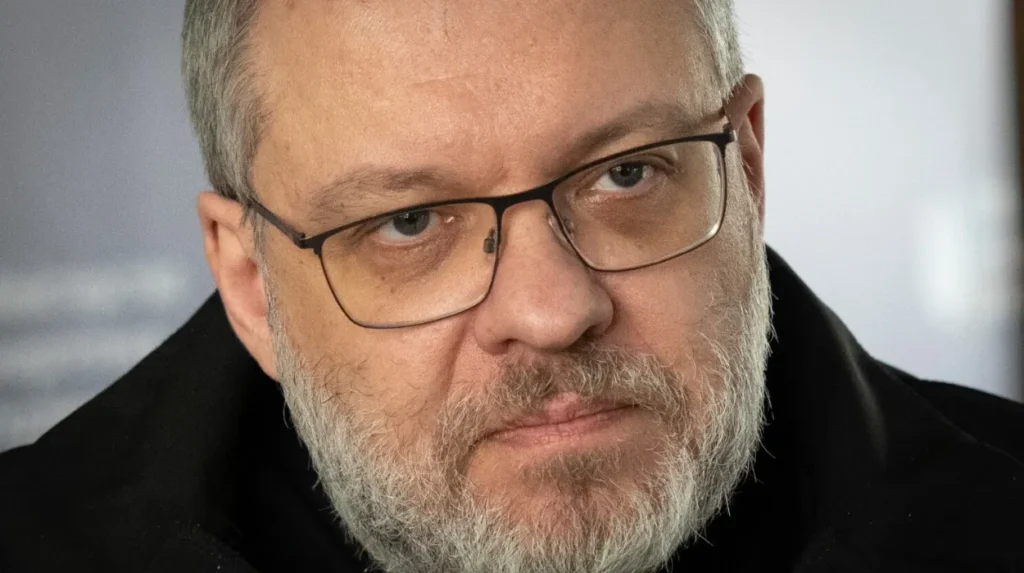Ukraine is facing a major corruption scandal involving its energy sector, prompting the resignation of its justice and energy ministers and sanctions against key figures close to President Volodymyr Zelenskyy. The scandal centres on alleged $100 million kickbacks related to the state nuclear power company Energoatom, uncovered after a 15-month investigation by anti-corruption agencies.
Kyiv Ministers Resign Amid Embezzlement Scandal
As reported by Alex Crawford of Sky News, Justice Minister Herman Halushchenko and Energy Minister Svitlana Grynchuk resigned following a directive from President Volodymyr Zelenskyy on 12 November 2025. The resignations come amid a widening embezzlement and kickbacks scandal involving Ukraine’s state nuclear power company Energoatom, marking one of the most significant government crises since the Moscow invasion of Ukraine began. Halushchenko has vowed to defend himself legally, while Grynchuk stated on social media that no violations had occurred within her professional duties. The scandal unfolds at a critical juncture as Ukraine struggles against relentless Russian attacks on its energy infrastructure.
Extensive Investigation Reveals Corruption in Energy Sector
Patrick Reevell, David Brennan, and Dada Jovanovic of ABC News detail that the National Anti-Corruption Bureau of Ukraine (NABU) uncovered a “high-level” corruption scheme involving kickbacks worth $100 million from contractors hired to fortify energy infrastructure against Russian attacks. The investigation resulted in the detention of five suspects and notification to seven others, including a businessman identified as the head of the criminal organisation, a former adviser to the energy minister, and a former deputy prime minister. The probe also reportedly involves the FBI and centres on allegations of money laundering and bribery.
Sanctions and Legal Actions Against Key Figures
According to Mstyslav Chernov of The Kyiv Independent, sanctions have been imposed by President Zelenskyy on two Israeli citizens implicated in the scandal, Timur Mindich and Oleksandr Tsukerman. Both have fled Ukraine and face charges related to the scheme. Mindich, the principal organiser of the alleged corruption, is co-owner of Zelenskyy’s Kvartal 95 production company. Tsukerman led a money laundering operation connected to the scandal. Other influential figures implicated include former Deputy Prime Minister Oleksiy Chernyshov, Energy Minister Svitlana Grynchuk, Justice Minister Herman Halushchenko, and Rustem Umerov, former defence minister.
Prime Minister Yulia Svyrydenko confirmed the government’s initiation of the sanctions process and urged the implicated ministers to submit their resignations, which they did promptly. Zelenskyy has called for parliamentary endorsement of these resignations.
Zelenskyy Addresses the Nation Amidst Scandal
As reported by Anne-Laure Barral of Le Monde, President Zelenskyy expressed a solemn tone before the nation, emphasising the gravity of the situation amid widespread power outages and ongoing Russian aggression. He labelled the fraudulent schemes as “absolutely unacceptable” within the vital energy sector and pledged to cooperate with anti-corruption authorities. Zelenskyy has reinstated the autonomy of anti-corruption agencies after earlier attempts to control them sparked public backlash and international criticism. The scandal has led to considerable loss of trust between the government and society, with calls for dialogue to restore public confidence.
Impact on Ukraine’s Energy Security and Public Morale
DW News highlights that despite the scandal, Energoatom has assured the public that the investigation will neither affect its assets nor its financial position. The nuclear energy company’s operations continue uninterrupted even as Ukraine grapples with Russian strikes aimed at crippling its energy systems. The scandal emerges during an especially precarious time as the country races to secure European funds to offset energy shortages exacerbated by ongoing conflict.
Parliaments and Public Demand for Accountability
Ukraine’s parliament, the Verkhovna Rada, has been actively involved in reinforcing anti-corruption laws, including restrictions on contractors’ debt claims during martial law, which were exploited as part of the broader alleged scheme. The chair of the foreign affairs committee, Oleksandr Merezhko, openly acknowledged the erosion of public trust and emphasised that restoring confidence requires ongoing dialogue between the government and citizens.
Prime Minister Yulia Svyrydenko noted the government’s commitment to sanctioning those involved while reaffirming the importance of transparency. Ukrainian media reports have underlined the seriousness of this scandal by comparing it to the ouster of previous ministers involved in military procurement scandals.
Views From Anti-Corruption Authorities and Officials
NABU has been at the forefront of the investigation, compiling substantial evidence through over 70 raids and 1,000 hours of wiretaps, which revealed details of the “Midas” scheme involving the diversion of funds and bribery in the energy sector. The bureau accused eight individuals of abuse of office, bribery, and possession of disproportionate assets. Ukrainian officials have been urged to cooperate fully with the probe to restore integrity to the government’s operations.
The ongoing investigation has also led to speculation about the extent of corruption and its reach into the highest levels of government, though no direct allegations have been made against President Zelenskyy himself. The revelations have nonetheless placed intense pressure on the president to demonstrate decisive action and to avoid shielding any associates involved.







